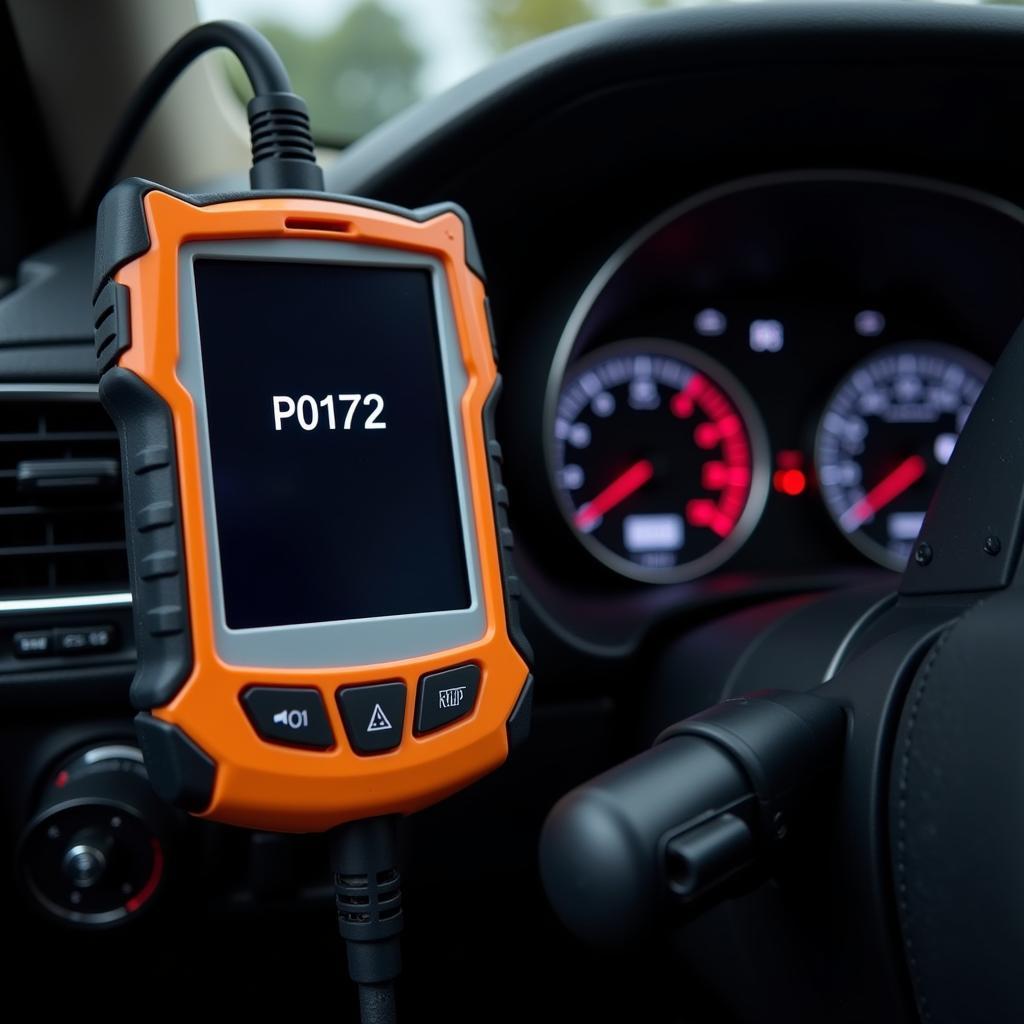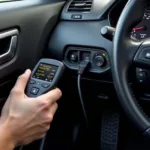The P0172 code, a common issue encountered by car owners, indicates a “System Too Rich (Bank 1)” problem. This essentially means that the engine control unit (ECU) detects an excessively rich air-fuel mixture in the engine cylinders belonging to Bank 1, the side containing cylinder #1. While encountering this code can be concerning, understanding its causes and solutions can empower you to address it effectively.
What Does the P0172 Code Mean?
The P0172 code signifies an imbalance in the air-fuel ratio, a critical factor in your engine’s performance and efficiency. Ideally, this ratio should be precisely maintained at 14.7 parts of air to 1 part of fuel, often referred to as the stoichiometric ratio. This optimal mixture ensures complete combustion, maximizing fuel economy and minimizing emissions.
When the air-fuel mixture leans towards having too much fuel, it becomes “rich.” While a slightly rich mixture might provide a temporary power boost, a consistently rich mixture like the one indicated by the P0172 code can lead to various engine problems and increased emissions.
Common Causes of the P0172 Code
Identifying the root cause of the P0172 code is crucial for effective repair. Here are some of the most common culprits:
-
Faulty Oxygen Sensor (O2 Sensor): The oxygen sensor plays a vital role in monitoring the oxygen content in the exhaust gases and relaying this information to the ECU. A malfunctioning O2 sensor, particularly the one located upstream of the catalytic converter on Bank 1, can send inaccurate readings, leading the ECU to miscalculate the air-fuel ratio and inject excessive fuel.
-
Dirty or Clogged Air Filter: The air filter prevents dirt, debris, and contaminants from entering the engine. A heavily soiled or clogged air filter restricts airflow, disrupting the air-fuel balance and causing a rich mixture.
-
Malfunctioning Mass Air Flow (MAF) Sensor: The MAF sensor measures the volume of air entering the engine. An inaccurate reading from a faulty MAF sensor can result in the ECU misjudging the required fuel amount, leading to a rich condition.
-
Leaking Fuel Injectors: Fuel injectors are responsible for spraying the precise amount of fuel into the engine cylinders. Leaky or stuck-open injectors can deliver an excessive amount of fuel, upsetting the air-fuel ratio.
-
Vacuum Leaks: Vacuum leaks in the intake manifold or other vacuum-operated components can disrupt the engine’s ability to maintain the correct air-fuel mixture.
Symptoms Associated with the P0172 Code
The P0172 code often manifests through noticeable symptoms, including:
-
Illuminated Check Engine Light: The most apparent sign is the illumination of the check engine light on your dashboard.
-
Reduced Fuel Economy: A rich fuel mixture leads to inefficient fuel consumption, resulting in decreased mileage.
-
Rough Engine Idle: An excessively rich mixture can cause the engine to idle roughly or inconsistently.
-
Black Smoke from Exhaust: Incomplete combustion due to a rich mixture can result in black smoke emanating from the exhaust pipe.
-
Strong Fuel Odor: An unusually strong smell of gasoline from the exhaust or engine bay can be a sign of a rich fuel condition.
Diagnosing the P0172 Code
Accurately diagnosing the underlying cause of the P0172 code requires a systematic approach:
-
Read the Code: Use an lcd screen obd2 scanner to read the error codes stored in your car’s ECU. The P0172 code confirms the “System Too Rich (Bank 1)” issue.
-
Inspect the Air Filter: Begin with a visual inspection of the air filter. A dirty or clogged filter can be easily replaced.
-
Check for Vacuum Leaks: Inspect the intake manifold, vacuum hoses, and other vacuum-operated components for any signs of leaks, cracks, or loose connections.
-
Inspect Fuel Injectors: Check the fuel injectors for leaks or signs of malfunction. You may need to consult a mechanic for specialized testing.
-
Test the Oxygen Sensors: Test the oxygen sensors, particularly the upstream sensor on Bank 1, for proper function. This may involve checking their voltage readings using a multimeter.
-
Diagnose the MAF Sensor: The MAF sensor can be tested using a multimeter to check its voltage readings and compare them to manufacturer specifications.
Resolving the P0172 Code
The solution to the P0172 code depends entirely on the identified cause. Common repair strategies include:
-
Replacing Faulty Components: Worn-out or malfunctioning parts, such as the oxygen sensor, MAF sensor, or fuel injectors, will need replacement with new, high-quality components.
-
Cleaning or Replacing the Air Filter: A dirty air filter should be replaced, while a clogged filter necessitates a new one to restore proper airflow.
-
Repairing Vacuum Leaks: Sealing any identified vacuum leaks is essential to ensure the engine maintains the correct air-fuel mixture.
-
Consulting a Qualified Mechanic: If the diagnosis proves challenging or requires specialized tools and expertise, seeking assistance from a qualified mechanic is highly recommended.
Conclusion
The P0172 code, while potentially indicative of a significant engine issue, can be effectively resolved with proper diagnosis and repair. Using an OBD2 scanner to identify the problem and understanding its potential causes are the first steps toward a solution. By addressing the root cause, you can restore your vehicle’s performance, fuel efficiency, and ensure optimal engine health.


